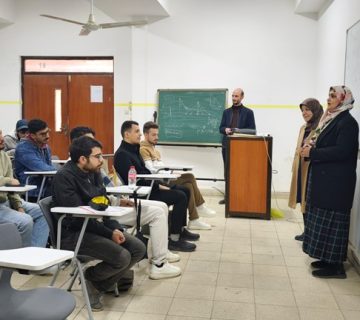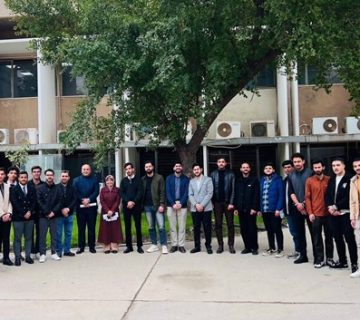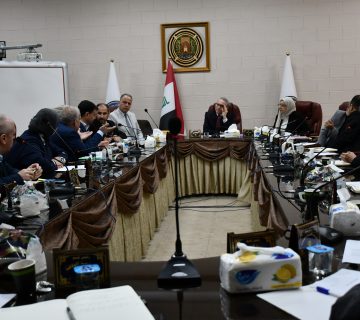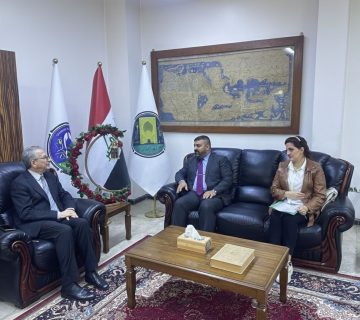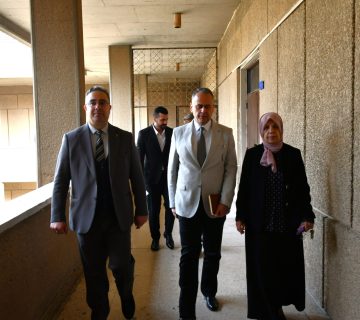It was conducted on Thursday 1/6/2023, in hall of Dr. Munther Al-Droubi the discussion of the doctoral dissertation of the student Mustafa Jasim Awad, which is tagged: “Assessment of Solar Distillation Efficiency Using Different Design Considerations”.
The discussion committee consisted of names listed below:
Prof. Dr. Akram W. Ezzat – University of Baghdad/ College of Engineering/ Department of Mechanical Engineering–Chairman.
Prof. Dr. Muna Sabah . Kassim – Al-Mustansiriyah university / College of Engineering / Department of Mechanical Engineering – Member.
Asst. Prof. Dr. Basma Ismael. Hussein – University of Baghdad / College of Engineering / Department of Chemical Engineering – Member.
Asst. Prof. Dr. Ayser Muneer Flayh – University of Baghdad/ College of Engineering/ Department of Mechanical Engineering– Member.
Asst. Prof. Dr. Ali Omran Muhsin – University of Baghdad/ College of Engineering/ Department of Water resources engineering– Member.
Prof. Dr. Karima E. Amori – University of Baghdad / College of Engineering / Department of Mechanical Engineering – Supervisor.
The dissertation was summarized as follows:
Solar distillation is an effective method of generating distilled water in areas with abundant sunshine and adequate water unfit for human consumption or other activities. Therefore, the present work suggests a new design of a tubular solar still for distillation that uses solar energy to evaporate saline water. This work proposes a new tracking tubular solar still with an extensive investigation to optimize its optical and thermal performance. The novelty of the present work is the use of a heat pipe with different configurations to enhance the performance of the tubular solar still. Also, a novel glass cover of a hexagonal shape is used.
First, an optical investigation has been conducted to choose the receiver optimum design among many designs including circular, square, triangular, elliptical, and a new design of circular-square named channel receiver. Results showed that the best optical design is the channel receiver with an optical efficiency of 84% and illumination uniformity of 62%.
The proposed tubular solar still, of a hexagonal glass cover, is presented as hexagonal solar still (HSS). To improve the thermal performance of the hexagonal solar still, a heat pipe is integrated inside the receiver of the still in different configurations. These configurations are cylindrical heat pipe with an evaporator heated by direct solar radiation (HSS-HP), heat pipe with a cylindrical evaporator heated by a secondary parabolic linear concentrator (HSS-HPSC), and heat pipe with a spherical evaporator heated by a parabolic dish concentrator (HSS-HPDC). The effect of saline water depth inside the receiver (55 mm, 65 mm) and the tilt angle (10o, 15o) has been investigated for all configurations. The results revealed that distilled water productivity flux of the HSS has been enhanced by 42% and 62 % for the HSS-HP and HSS-HPSC respectively, while in the case of the HSS-HPDC, there isn’t any enhancement. Also, the thermal efficiency of the HSS has been enhanced by 42% and 49 % for the HSS-HP and HSS-HPSC respectively, while in the case of the HSS-HPDC, the efficiency is reduced by 50%. Increasing the saline water depth by 18 % exhibited an increase in the daily yield by 16%, 15%, 15%, and 27 for HSS-HPDC, HSS-HPSC, HSS-HP, and HSS respectively at an inclination angle of 10o. While it was improved by 26 %, 21%, 21%, and 32 % when the inclination angle was 15o. The best design was the HSS-HPSC with a daily yield of 5.3 liters.
The hourly yield results from the present work have been compared with those predicted from a previous mathematical model. The deviation between the experimental and predicted results ranges between 9% and 37%.
After scientific discussions by the discussion committee members on the contents of the dissertation in-depth and expressing their observations, directives, and defense by the student, the dissertation was accepted and the student was awarded the Ph.D. in mechanical engineering sciences/ Thermo-Fluids with a grade of excellent.



